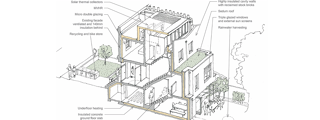80% of the buildings we will have in 2050 have already been built, but many have poor levels of energy performance and don’t always suit contemporary lifestyles. What can we as designers do to address this challenge?
Abbie Graham, a first year student on Birmingham School of Architecture and Design’s BA (Hons) Design for Future Living course, reports on a seminar with industry experts exploring how we can increase the sustainability of existing homes while making great places to live.
In February, as part of our Future Homes 1 module, we hosted an online seminar and Q&A session to discuss the challenges surrounding retrofit projects, as well as the advantages and disadvantages. Andy Sutton, Director of Design & Innovation at Sero Homes, Kit Knowles, Director of Ecospheric, and Robert Prewett, Director of Prewett Bizley Architects joined us to discuss the knowledge they had gained from their own projects. The day set out to explore the challenges and opportunities of retrofitting and adapting homes to meet the climate challenge.
Andy Sutton from Sero Homes was invited to join us by course collaborators MOBIE. He and his team aim to take on the big challenges of the UK housing crisis and explore how they can redevelop homes into something more sustainable, contemporary, and fit for their clients. Sustainability was his focus when retrofitting homes as he identified this was a major contributor to the cost of living. Listening to him talk about his passion for sustainability, how we can improve building houses in the future and the changes we can make to our homes was an eye-opener and it was exciting to see how we all can make a difference. Andy described a number of projects he has been involved with before answering our questions and looking at our project work.
In the second part of the day, two leading experts discussed their experiences in adapting and retrofitting existing homes to improve energy efficiency and respond to the needs of contemporary living.
Robert Prewett, Director of Prewett Bizley Architects, has expertise in low-carbon construction and particularly in the field of retrofit. He discussed how heating demand dominates energy consumption in homes, how fabric improvements can reverse that and how this might be achieved alongside other adaptations. Bob focused on a refurbishment project using Passivhaus techniques, his first deep retrofit project from around 10 years ago. He expressed that this particular project taught him a lot about the physics and concepts that go into an effective retrofit and changed the direction of his architectural practice. We learned that retrofit projects rarely come as just green home improvements and are often included in a home makeover, extensions, additions or alternations. He also focused on understanding how long retrofit projects take to pay back in terms of carbon saving. After completion, the project took 5.76 years to pay back and the practice is focused on understanding how to improve this payback period in future projects.
Kit Knowles, Director of Ecospheric, focuses on pioneering eco developments that save carbon and drive technological change. He presented Ecospheric’s Zetland Passive House project, Europe's first EnerPHit Plus retrofit, and their latest development which involves the retrofit of a 400-year-old Grade II* listed Elizabethan manor house. Going up from the scale of the house, Kit was also passionate about large scale retrofit and developing tools for implementation at city scale to ensure we met the 2050 requirements for all homes across the UK. However in discussion it was evident that the individual quirks within every home made this increasingly difficult to put into practice; each house has its own story and needs to be understood in detail. One interesting idea discussed in the seminar was using a glass greenhouse on the side of the home to catch the sun, collecting heat which is stored as a heat source for the home.
All of the sessions were fascinating and provided new ideas to use in our own retrofit projects and to carry with us for future projects within the Design for Future Living course. The battle between every retrofit project being individual with unique challenges and the statistic of 80% of homes that we will have in 2050 already being built and requiring these improvements to meet our zero carbon commitments was a key message throughout all three sessions. Opening up the question for us as students, how do we fix the growing issue of unsustainable homes before the 2050 zero carbon target?
Architecture at BCU
Find out more about our courses





